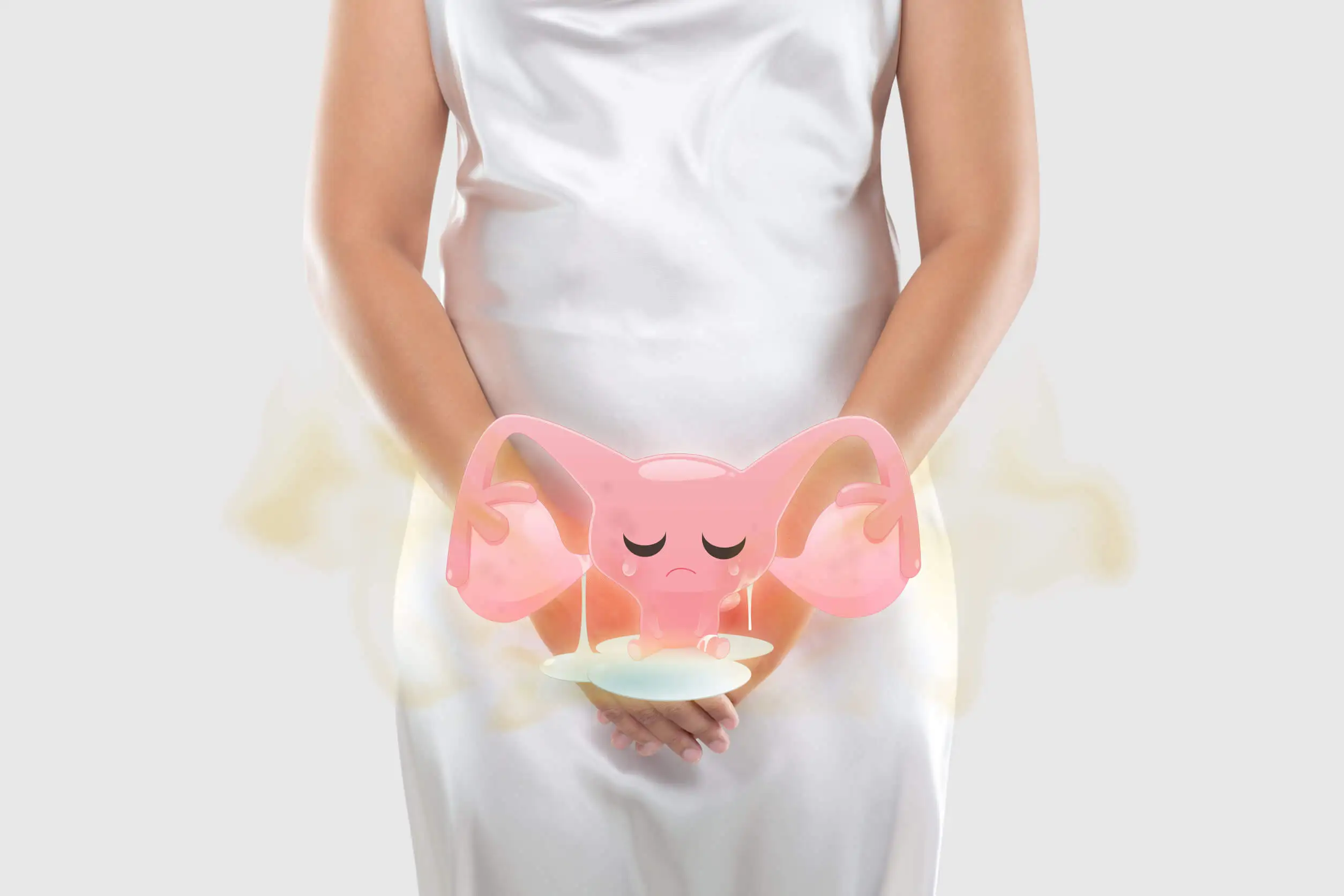Types of Vaginal Odor: Causes and Treatment

Vaginal odors are different and specific to each woman, as they depend on the vaginal flora and various factors such as hormone levels, sexual activity, diet, sweat, intimate hygiene, the presence of infections, and vaginal pH. In today’s article, we’ll look at different types of vaginal odor and tell you which ones you should be concerned about.
Many different types of vaginal odor are normal. Others could warn of some sort of imbalance in their intimate area, and that’s why it’s important to get to know them.
Odors similar to bread, sweets, yogurt, and metal are normal (and healthy). However, when they’re strong or unpleasant odors (e.g., a rotten fish smell), a gynecologist should be consulted for an evaluation of the intimate area.
A medical evaluation is also necessary if the odor is accompanied by itching, burning, pain (especially during sex), vaginal bleeding (not related to the period), or a thick vaginal discharge.
Popular belief is that a healthy vagina should smell like flowers; however, this is far from the truth. The different products created to mask the natural odor of the vagina are considered, from a medical point of view, as harmful to the balance of the vaginal flora and can predispose to different infections.
What do vaginal odors depend on?
It’s normal for there to be subtle changes in a woman’s vaginal odor, because the odor depends on the vaginal flora and vaginal pH. These elements can be modified by multiple factors.
Diet is one of the influencing factors. The consumption of a lot of citrus fruits is associated with sweet odors, while the consumption of refined carbohydrates and sugars is linked to a more accentuated bread odor (due to yeasts present in the vaginal flora).
The vaginal mucosa lining the vagina is very rich in lactobacilli, a microorganism that is also present in yogurt. For this reason, the smell of yogurt in a healthy vagina is very characteristic and typical.
The vaginal pH is slightly acidic, around 4.5, and its balance allows the body to maintain the vaginal flora. When it’s modified and there’s a prevalence of certain microorganisms over others, then infections can occur.
In addition to food, vaginal pH can be modified by heterosexual intercourse without condoms. This is because semen has a relatively alkaline pH (7.2 to 8), which modifies the pH of the vagina and can cause different vaginal odors after vaginal sex.
On the other hand, the peculiar vaginal odor of each woman is due to the apocrine glands that secrete fluids (sweat) with a typical odor that participates in sexual attraction.
Natural factors that alter vaginal odors
Hormonal changes also affect vaginal odors. In fact, during menopause, there’s a decrease in estrogen that alters the pH flow pattern and vaginal flora. Thus, vaginal odor and discharge change, and there’s increased vaginal dryness.
On the other hand, during menstruation, there’s a very characteristic metallic odor due to the presence of blood. In pregnancy or lactation, hormones can produce an increase in vaginal secretions and this increases the intensity of the vaginal odor.
Types of vaginal odor

Yogurt odor
A yogurt odor in the vagina is a sour or fermented aroma. It’s caused by the presence of lactobacilli, as mentioned above.
Metallic or coppery odor
A metallic odor is characteristic at the time of menstruation and a few days after. It’s produced by changes in vaginal pH and blood, due to its iron content. A metallic odor can also occur from light bleeding after sex, vaginal dryness, or vigorous sex with minor abrasions.
Sweaty, herbal, or earthy odor
Although it’s a less pleasant odor, it’s associated with the combination of groin sweat and vaginal bacteria. It isn’t a medical condition and improves with good hygiene. This odor is associated with emotional stress that can cause increased secretion of the sweat glands.
Chemical, ammonia, or cleaning products odor
Similar to bleach or ammonia, this odor may be due to several reasons; for example, urine. Urine contains urea (a by-product of ammonia) which can accumulate around the vulva or in underwear. In conditions of dehydration, it can also be created by an accumulation of urea. Bacterial vaginosis and trichomoniasis can also cause it.
Sweet or beer-like odor
A sweet odor in the vagina may signal an overgrowth of yeast (fungus). These types of vaginal odors are similar to the smell of honey, bread, or cookies.
Yeast overgrowth causes vaginal infections, specifically Candida albicans (vaginal candidiasis). It’s also manifested by itching and irritation of the vulva and vagina, and a thick, sticky discharge resembling cheese or cut milk.
What you need to know about: Eight Ways to Treat Vaginal Dryness
Rotten fish odor
Rotten fish odor occurs frequently as one of the different types of vaginal odor, and is due to the presence of a vaginal infection resulting from altered vaginal flora. The modification of the vaginal pH produces an uncontrolled growth of bacteria that cause bacterial vaginosis.
Bacterial vaginosis produces foul vaginal odors, with a thick yellowish or orange discharge, in addition to other associated symptoms such as itching, irritation, and burning when urinating.
It may also be due to trichomoniasis or Trichomonas vaginalis infection which is the most common curable sexually transmitted infection (only with a course of antibiotics). In this case, the smell of rotten fish is more pronounced than in bacterial vaginosis and the discharge is usually greenish-grayish and frothy.
There are other sexually transmitted infections associated with a foul odor, such as gonorrhea (which causes increased vaginal discharge, lower abdominal pain, and a burning sensation during urination) and chlamydia (an abnormal vaginal discharge with pain during intercourse and urination).
Get to know more about: 5 Calming Remedies for Vaginal Itching
A rotting odor
An odor of putrefaction or rotting may be due to a tampon being left inside the vaginal canal for several days (which begins to decompose). You may be surprised to know that this is common.
Tampons left in for more than 8 hours can lead to a very serious infection known as toxic shock syndrome. This is produced by toxins released by the Staphylococcus aureus bacteria (found naturally in the vagina). There may be high fever, seizures, nausea, vomiting, confusion, fainting, and dizziness.
A foul-smelling odor
Cervical cancer usually doesn’t cause any symptoms in the early stages, but lesions may produce a foul-smelling discharge, as well as abnormal vaginal bleeding, pelvic pain, and abdominal pain. A foul-smelling odor can also be caused by vaginal cancer or the presence of a rectovaginal fistula (connecting the rectum to the vagina).
Should all vaginal odors be treated?

A healthy vagina doesn’t smell like flowers. The different types of vaginal odor vary from woman to woman, and, as mentioned, are influenced by several different factors. When the odor is metallic, sour (like yogurt), a little sweet, or sweaty, it isn’t a cause for concern and doesn’t require specific treatment. It’s only recommended that you maintain good intimate hygiene.
However, if other symptoms such as itching, irritation, redness, abnormal discharge, pain during intercourse, and burning during urination appear, then a gynecologist should be consulted for an evaluation of the vaginal canal.
The main causes of unpleasant vaginal odors are infectious. Bacterial vaginosis, vaginal candidiasis, and other infections can be controlled with the use of oral drugs and vaginal ova. However, you should go to the doctor for proper management.
Read more about: 5 Natural Remedies for Vaginal Odor
Douching and intimate deodorants should be avoided
It isn’t necessary to eliminate vaginal odor, unless it’s unpleasant or associated with other symptoms or increased vaginal discharge. Of course, treatment should be prescribed by a physician.
An increased use of douching and intimate deodorants to eliminate vaginal odor causes changes in vaginal pH and bacterial flora, as well as irritation. The vaginal pH keeps the vaginal flora in balance, and when it’s modified there’s bacterial overgrowth that ends in bacterial vaginosis.
Recommendations for maintaining intimate hygiene
Vaginal odors are normal. However, it’s important to recognize when changes occur that could be a warning of a health problem. The following tips should be taken into consideration when maintaining good intimate hygiene:
- Wash only the external genital area and use plenty of warm water and a mild soap with neutral pH (no perfumes or dyes).
- Avoid douching and intimate deodorants.
- Bathe daily.
- Change underwear daily, and preferably use cotton garments that aren’t tight-fitting or synthetic.
- Keep the intimate area clean and dry.
- Don’t use sanitary towels every day.
- Have a balanced diet rich in fruits and vegetables, and probiotics such as yogurt.
All cited sources were thoroughly reviewed by our team to ensure their quality, reliability, currency, and validity. The bibliography of this article was considered reliable and of academic or scientific accuracy.
- Maeda, K., Wada, N., & Shida, A. (2023). Treatment of rectovaginal Fistula. Journal of the Anus, Rectum and Colon, 7(2), 52-62. https://www.jstage.jst.go.jp/article/jarc/7/2/7_2023-007/_article/-char/ja/
- Morgan, J. P. S., Moya, L. C. A., & Mendez, E. G. (2021). Vaginosis Bacteriana–Actualización y novedad terapéutica. Revista Ciencia y Salud Integrando Conocimientos, 5(6), 85-93. https://revistacienciaysalud.ac.cr/ojs/index.php/cienciaysalud/article/view/387
- Navarro, E. Á., Palacian, N. S., Peniche, N. G., Martínez, M. M. M., Pérez, N. M., & Berdejo, S. D. (2021). Síndrome de shock tóxico. Revista Sanitaria de Investigación, 2(9), 90. https://dialnet.unirioja.es/servlet/articulo?codigo=8081000
- Schumann, J. A., & Plasner, S. (2023). Trichomoniasis. StatPearls Publishing. https://www.ncbi.nlm.nih.gov/books/NBK534826/
- Vaughan, C. P., & Markland, A. D. (2020). Urinary incontinence in women. Annals of internal medicine, 172(3), ITC17-ITC32. https://www.acpjournals.org/doi/abs/10.7326/AITC202002040
- Willems, H. M., Ahmed, S. S., Liu, J., Xu, Z., & Peters, B. M. (2020). Vulvovaginal candidiasis: a current understanding and burning questions. Journal of Fungi, 6(1), 1-20. https://www.mdpi.com/2309-608X/6/1/27
This text is provided for informational purposes only and does not replace consultation with a professional. If in doubt, consult your specialist.









